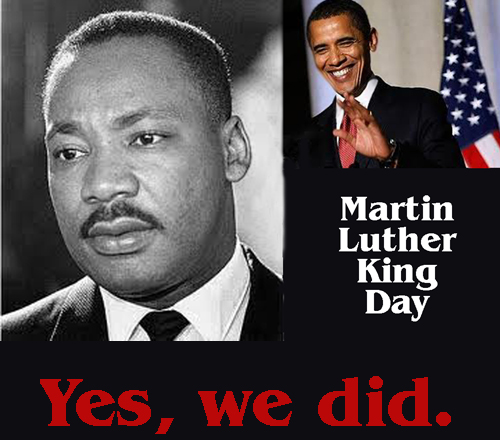 Today is one of the most important benchmarks in the American calendar, the Martin Luther King federal holiday. When I look back a year, I see progress towards greater social justice all over the world.
Today is one of the most important benchmarks in the American calendar, the Martin Luther King federal holiday. When I look back a year, I see progress towards greater social justice all over the world.
It isn’t uniform, of course. What’s transpiring in north Africa seems at this moment a step backwards. The misguided South African ruling party toys with national catastrophe. Central Africa is more turbulent than ever, and the entrenched and wicked leaders in Uganda and Rwanda seem hell-bent on those countries’ global isolation and backwardness.
Dr. King was the most profound proponent of radical change by and strictly by non-violence. That means his version of social change must come either within the existing system or through non-violent civil disobedience.
It is hard to imagine how Mali, Uganda or the eastern Congo will be moved forward by non-violence.
But even during Dr. King’s days civil disobedience was not without violence. Was the threatened doctors’ and nurses’ strike in Kenya to be non-violent? Technically, yes, but thousands would have died. The many various teacher strikes throughout Africa this year were all non-violent per se, but children denied their only substantial meal of the day became sick.
What I most remember of King’s turbulent last days was unbelievable violence. My most vivid memory is as a very young journalist penned under a burning El Stop in downtown Chicago while the city raged in reaction to King’s assassination.
I remember gun fire was a regular sound in my low-rent apartment in Washington, D.C. during the summer of 1968. Or the unending sirens and tear gas around my apartment in Berkeley that fall.
King is duly revered for radically changing American society with non-violence. Yet what I remember most is fire, bullets and ambulances.
Today President Obama is inaugurated for the second time. Our first African American President, some of whose relatives still reside in Kenya. The racist opposition to him remains strong. Powerful white elected representatives in Congress still engage in racial slurs and oppose him simply because he’s not white.
During his first term he battled mounting opposition to reverse his election on the grounds he wasn’t a native born American, despite his native State of Hawaii publishing nearly a million official copies of his birth certificate.
The horrible individual gun violence which has occurred in America during his first term, in cities like my native Chicago, and in horrific incidents like Sandy Hook and Aurora is due certainly in part — perhaps large part — to the growing ethnic and social divides that cleave America apart.
King’s philosophy of non-violence, like Gandhi’s and to a much lesser but significant extent Mandela’s, were not eras of no violence. There was incredible violence, and this violence — as with the sizzling El Stop that nearly fell on me — will be blazoned in our memories forever. But with time we’re able to reflect that that violence was the reaction to those heroes’ methodical, unswerving actions for a freer, fairer society.
And that the victims of that violence, whether a young student protestor clobbered by a policeman’s baton or an innocent six-year old school child gunned down by a madman embodying the evil of his society, are the heroic soldiers in a more just war than those who fire on enemies to wear medals.
Today, my President is black. My Attorney General is black. Dozens of colleagues, friends, employees and clients are yellow and orange and black, and this compared to my father’s generation would have been all but unbelievable. The world has changed for the better.
Happy Birthday, Martin! You’d have been 84, today!
Is Obama elect and re-elect the total sum testament to the latent frustrations of the majority US electorate in regards to its Foreign Policy’s? Or is it a statement to the collapse of the old enemy and the cold war? Or is it just a collective attempt to re-join the ‘normal’ diplomatic and political world order?
Or is it a vote to the latent/psychological soul of America (assuming there is a collective soul…whatever a soul is, in singular or collective form)?
“Central Africa is more turbulent than ever, and the entrenched and wicked leaders in Uganda and Rwanda seem hell-bent on those countries’ global isolation and backwardness.”
We would have to go through a boat load of histories just in order to have a common understanding into the geopolitical complexities of Central Africa. Hence in my opinion your statement about the conundrum that is Central Africa (CAR and eastern-DRC) above is a bit ignorant. Ignorant that you’ve chosen at rudimental levels, to ignore the cultural-economic-political and colonial or modern day markers, or mechanisations of the indigents and their preferences in terms of governance…in colonial times or now!!!.
They were/are a forcibly demarcated populous…and the geo-politics of that enforcement has caused them a genocide and a life-time of cultural hurt and political-imbalance. I personally believe to end this cycle we have to politically and diplomatically evolve and involve our understanding….to what end or how. It’s not for me to say, individually un-like you!!!
Many wiser African statesmen and elders have been looking for a solution to these troubles. But in the case of the eastern-DRC, it’s been a case of too much mineral wealth and too many hidden benefactors and rebel enablers and conjoined state-cooperate economic interests. Question is; what do African’s need columbite–tantalite for?